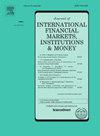Do companies’ green credentials enhance trade credit provisions? Global evidence
IF 6.1
2区 经济学
Q1 BUSINESS, FINANCE
Journal of International Financial Markets Institutions & Money
Pub Date : 2025-07-28
DOI:10.1016/j.intfin.2025.102204
引用次数: 0
Abstract
We investigate the impact of corporate renewable energy (RE) adoption on suppliers’ trade credit provisions. Using a global sample of 30 countries, we establish that firms engaging in higher RE consumption secure increased trade credit. Our results remain robust to a variety of sensitivity tests and after accounting for potential endogeneity concerns using the Paris Agreement and companies switching to green energy as exogenous shocks. Our channel analysis reveals that RE take-up mitigates companies’ environmental risk (proxied by environmental violation fines, media coverage of environmental controversies, GHG emissions, and environmental policy stringency). Additional tests reveal that the relationship between RE and trade credit is stronger for adopters with lower bargaining power and those in environmentally sensitive industries. Cross-sectional analysis reveals that the documented positive impact is stronger in developed economies and during periods of high policy uncertainty. Finally, we discover that RE adoption enhances firm value and promotes a supply-chain spillover, since adopters are also more likely to extend trade credit to their own customers. Our paper provides original evidence that RE adapting improves companies’ access to informal financing in the form of higher trade credit.
企业的绿色证书是否能提高贸易信贷条款?全球的证据
我们研究了企业采用可再生能源对供应商贸易信贷规定的影响。使用全球30个国家的样本,我们确定从事更高可再生能源消费的公司获得了更多的贸易信贷。在考虑了《巴黎协定》和企业转向绿色能源作为外生冲击的潜在内生性问题后,我们的结果在各种敏感性测试中仍然稳健。我们的渠道分析表明,可再生能源的使用减轻了公司的环境风险(以环境违规罚款、媒体对环境争议的报道、温室气体排放和环境政策严格程度为代表)。额外的测试表明,可再生能源与贸易信贷之间的关系对于议价能力较低的采用者和环境敏感行业的采用者更强。横断面分析显示,记录在案的积极影响在发达经济体和政策高度不确定性时期更为强烈。最后,我们发现可再生能源的采用提高了企业价值并促进了供应链溢出,因为采用者也更有可能将贸易信贷扩展到他们自己的客户。本文提供的原始证据表明,可再生能源适应改善了企业获得更高贸易信贷形式的非正式融资的途径。
本文章由计算机程序翻译,如有差异,请以英文原文为准。
求助全文
约1分钟内获得全文
求助全文
来源期刊
CiteScore
6.60
自引率
10.00%
发文量
142
期刊介绍:
International trade, financing and investments, and the related cash and credit transactions, have grown at an extremely rapid pace in recent years. The international monetary system has continued to evolve to accommodate the need for foreign-currency denominated transactions and in the process has provided opportunities for its ongoing observation and study. The purpose of the Journal of International Financial Markets, Institutions & Money is to publish rigorous, original articles dealing with the international aspects of financial markets, institutions and money. Theoretical/conceptual and empirical papers providing meaningful insights into the subject areas will be considered. The following topic areas, although not exhaustive, are representative of the coverage in this Journal. • International financial markets • International securities markets • Foreign exchange markets • Eurocurrency markets • International syndications • Term structures of Eurocurrency rates • Determination of exchange rates • Information, speculation and parity • Forward rates and swaps • International payment mechanisms • International commercial banking; • International investment banking • Central bank intervention • International monetary systems • Balance of payments.

 求助内容:
求助内容: 应助结果提醒方式:
应助结果提醒方式:


